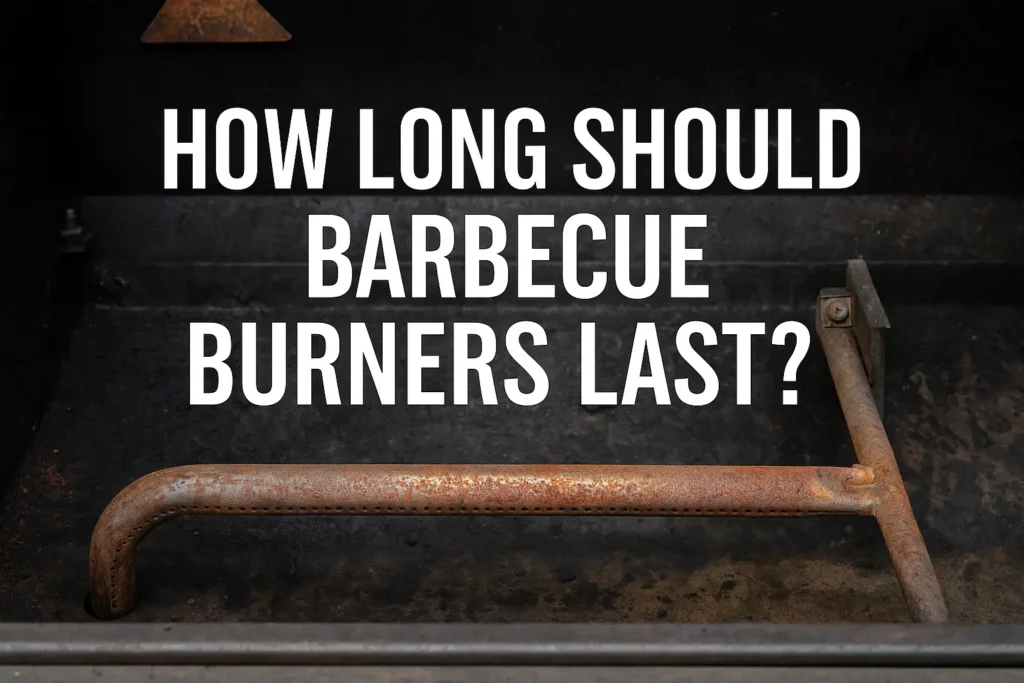This post may contain affiliate links. If you use these links to buy something we may earn a small commission. Thanks.
When it comes to grilling, the burner is the heartbeat of your barbecue. It’s the component that transforms gas into heat, enabling you to achieve those perfect sears and mouth-watering smoky flavors. Yet, many grill owners overlook one important question: how long should barbecue burners actually last?
Understanding the expected lifespan of BBQ burners and how to extend it can save you from frustrating mid-season breakdowns and ensure consistent performance year after year. This comprehensive guide covers everything you need to know about BBQ burner longevity, from average lifespan ranges and influencing factors to maintenance tips and signs of replacement.

Introduction
Barbecue burners endure extreme heat, grease, and weather elements. While they are built to be durable, they are not invincible. Over time, even the best burners will degrade, affecting both cooking efficiency and safety.
Knowing how long your burner should last helps you:
- Plan timely replacements
- Avoid unexpected grill failures
- Maintain food quality and safety
- Extend the lifespan of the entire grill unit
Whether you’re a weekend griller or a year-round BBQ enthusiast, this guide will help you understand what to expect from your burners and how to care for them.
Average Lifespan of BBQ Burners
General Lifespan Range
Most BBQ burners last anywhere from 2 to 10 years, depending on several variables like material, usage, and upkeep. Here’s a breakdown:
| Burner Type | Estimated Lifespan |
|---|---|
| Regular steel | 2 to 4 years |
| Stainless steel | 5 to 10 years |
| Brass or cast iron | 5 to 7+ years |
| Ceramic infrared | 6 to 10 years (with care) |
These ranges represent typical usage in moderate conditions. If you grill every day or leave your BBQ exposed to harsh weather, expect a shorter lifespan.
Manufacturer vs. Real-World Use
Many grill manufacturers provide lifespan expectations in their manuals. However, real-world performance often varies. A burner listed as “durable for 8 years” might wear out in 4 if neglected—or last even longer with proper maintenance.
Factors That Affect Burner Longevity
Several key factors influence how long your BBQ burner will last:
1. Material Quality
The type of metal your burner is made from plays the biggest role:
- Regular steel corrodes quickly.
- Stainless steel resists rust and heat damage better.
- Brass and cast iron offer durability but require more upkeep.
2. Frequency of Use
Grilling once a week vs. five times a week dramatically impacts wear. Frequent use leads to quicker carbon buildup and exposure to heat stress.
3. Cleaning and Maintenance Routine
Neglected burners clog easily, rust faster, and perform poorly. Regular cleaning helps preserve burner integrity and airflow.
4. Exposure to Elements
Leaving your grill uncovered in rain, snow, or high humidity accelerates rust and metal fatigue. Coastal climates with salty air are particularly harsh.
5. Type of Fuel Used
Propane burns cleaner than natural gas, but both create combustion byproducts that can contribute to corrosion if not cleaned off regularly.
6. Grill Design and Airflow
Grills with poor airflow can cause burners to overheat, crack, or burn unevenly. Proper venting reduces stress on the burners.
Signs Your BBQ Burner Needs Replacing
Just because your grill turns on doesn’t mean your burners are in good shape. Here are some warning signs that indicate a burner is at the end of its life:
1. Uneven Flame Distribution
If parts of the burner flame are low or nonexistent, the burner may be clogged or deteriorating inside.
2. Visible Rust or Corrosion
A little surface rust is normal, but deep corrosion, cracks, or holes compromise burner performance and safety.
3. Yellow or Orange Flames
A healthy burner flame is mostly blue. Yellow/orange flames indicate poor gas-to-air mixture, often caused by corrosion or clogging.
4. Delayed or Inconsistent Ignition
If your grill struggles to ignite or keeps going out, the burner might not be channeling gas properly anymore.
5. Low Heat Output
A failing burner may not generate sufficient heat, which prolongs cook times and leads to uneven cooking.
How to Extend the Life of BBQ Burners
Proper maintenance is the key to extending the life of your barbecue burners. These simple practices can double their longevity:
1. Clean Burner Ports Regularly
Use a wire brush or pipe cleaner to remove clogs from the small holes along the burner tubes. Clogged ports cause uneven flames and poor ignition.
2. Cover Your Grill
A weatherproof grill cover protects against rain, snow, UV rays, and bird droppings—all of which accelerate corrosion.
3. Store the Grill Properly
If possible, store your grill in a garage or covered patio during off-seasons. Cold and moisture speed up metal fatigue.
4. Inspect Burners Seasonally
Look for rust, wear, cracks, or clogs before grilling season begins. Early detection can help prevent full burner failure.
5. Avoid Excessive Grease Buildup
Heavy marinades and fatty meats cause flare-ups that can damage the burner. Use drip trays and clean grease traps often.
6. Use Cooking Oil Spray Wisely
A light spray helps reduce sticking, but overuse leads to sticky residue buildup that clogs burner holes.
Maintenance Schedule for Longer Burner Life
Creating a regular cleaning and inspection schedule ensures your burners last as long as possible:
After Each Use:
- Brush food debris off grates and flame tamers
- Close the grill and cover it
Monthly:
- Check burner flame quality
- Clean the burner holes using a wire brush
- Ensure the igniter works properly
Seasonally:
- Remove the burners and inspect for rust, cracks, or holes
- Use compressed air or a pipe cleaner to clear burner tubes
- Tighten any loose fittings or igniter connections
Annually:
- Deep clean all components
- Replace old burner if rusted or damaged
- Lubricate metal parts to prevent corrosion
Sticking to this schedule will help you catch issues before they escalate into performance or safety problems.
When to Replace vs. Repair a Burner
Sometimes burners just need a deep clean. Other times, replacement is the safer and more cost-effective option.
When to Repair:
- Burner ports are clogged but the metal is intact
- Surface rust is minimal and can be scrubbed away
- The burner is still aligned and functioning but needs cleaning
When to Replace:
- Burner has visible holes or cracks
- Warping affects flame shape or direction
- Burner tube has rusted through
- Flames are unpredictable even after cleaning
- The igniter won’t work despite troubleshooting
Cost Comparison:
- New burner: $15–$70 depending on type and brand
- New grill: $150–$1000+
In many cases, replacing a burner is a cheap way to revitalize your grill without investing in a new unit.
Conclusion
So, how long should barbecue burners last?
In general, expect 2 to 10 years depending on:
- The quality of the material
- Frequency of use
- How well you clean and maintain your grill
Even the most durable burner won’t last forever, but a little maintenance goes a long way. Clean your burners regularly, inspect them seasonally, and protect your grill from the elements. With proper care, you’ll enjoy years of sizzling steaks, juicy burgers, and perfect char marks.
Don’t wait until your grill sputters out mid-BBQ. Stay proactive. Whether you’re a casual griller or a smoke-master, knowing the health of your burner can make all the difference in your outdoor cooking experience.
FAQs
Q1: Can I repaint or recoat a rusty BBQ burner to extend its life?
A: No, burners operate under high heat, and most coatings will burn off. It’s better to clean or replace the burner.
Q2: How do I tell what type of burner my grill uses?
A: Refer to your grill manual or check the manufacturer’s website using your grill’s model number.
Q3: Is it safe to continue using a burner with a small rust hole?
A: It’s not recommended. Even a small hole can cause improper gas flow, leading to unsafe cooking conditions or fire hazards.
Q4: Should I replace all burners at once or just the faulty one?
A: If one burner is failing and the others are aging or showing signs of wear, it’s often better to replace them all together for even performance.
